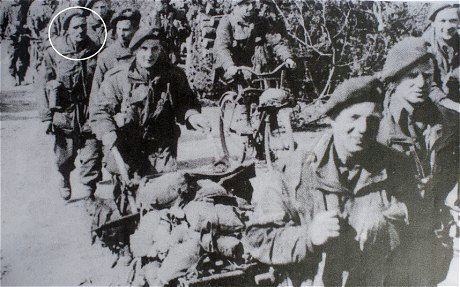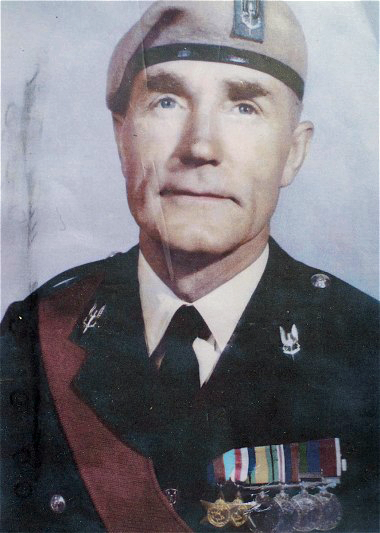D-Day veteran, 89, parachutes into Normandy again
Jock Hutton is parachuting into the same field he landed in 70 years ago before meeting the Prince of Wales, Jock Hutton surveys the wheat field in which, 70 years ago, he fell to earth. It was a moonlit night and his descent lasted but a few minutes. “We were jumping from 500 feet so there was no point in a reserve chute,” he remembers. “If the main hadn’t opened – well - goodnight.”
The Scotsman was 19, a member of 13th Battalion the Parachute Regiment, part of the British 6th Airborne Division, and he and his comrades were spearheading the Allied assault on German-occupied Europe. D Day was hardly an hour old when John James McDonald Hutton joined the fight. D-Day veteran Jock Hutton will be jumping again on the same field near Ranville, where he once parachuted into Normandy After parachuting into Normandy once and getting away with it, one would think Jock Hutton had had enough of such an experience. But today he is back, jumping again on to that same field near Ranville, together with hundreds of British, Canadian and American paratroopers re-enacting that fateful operation. A chat with the Prince of Wales will follow the drop, the first major event marking the 70th anniversary of Operation Overlord.
Even the youngest veterans of the invasion are now approaching 90 and this year’s commemoration is expected to be their last great gathering. The Queen and presidents Obama, Hollande and – controversially – Putin will meet during a series of events on Friday. “Should be cushy,” says Mr Hutton, when asked how today’s drop will go. “All I have to do is put my feet up.” He is in good hands, jumping tandem with Colour Sergeant Michael Blanchard of the Parachute Regiment. But he could, if necessary, go it alone. As recently as last year he was performing solo jumps in the Netherlands. However, a career in parachuting – all those jarring encounters with the ground - has taken its toll, and tandem is the sensible option for a man celebrating his 90th birthday later this year.

“The doctor said to me, ‘You haven’t got a tailbone anymore Mr Hutton. It’s gone up so far it’s now your collar bone,” he laughs. Tough as old boots is Jock Hutton. In old age he lost none of his power to intimidate. You wouldn’t want to get on the wrong side of him, even now. “I’ve always had a certain viciousness in my character,” he confesses, “brought on by the fact that we used to fight in the orphanage all the time. I made myself a wee bit awkward, as was my want.” Mr Hutton was born in Stirling in 1924, and was just four when his father, a soldier in the Argyll and Sutherland Highlanders, disappeared on a seven-year foreign posting. “My mother couldn’t handle my older brother and me alone, and I think she escaped to Canada, “ he says. “My father divorced her sometime later but when and how I do not know.”
Young John and his older brother William were sent to live with their grandmother, who soon died. “So off we went to the orphanage,” he says.” It was a deeply religious place. The welcome was having your hair shaved off while in a bath with three other children. “I wasn’t very bright at school and the teachers had no time for you if they considered you backward. So it was a miserable 11 years, reading the bible three times a day and going to church twice on a Sunday. There was a leather belt for corporal punishment. I was given the same halfpenny to put in the collection for 11 years.” One institution followed another. Jock’s father had decreed that his son should enter the Army as a boy soldier. He joined the Black Watch in July 1939 just shy of 15. “It was purgatory,” he says. "It drove me mad to the point where I considered going absent without leave. It was continual fatigues –peeling spuds.” He was desperate for some action. The new airborne forces promised adventure and in 1943 he was accepted for parachute training at Ringway near Manchester. Normandy was his first taste of action. The tension rose in the days before June 6.
“It was fairly obvious that it was coming,” he remembers. “Everyone was gearing up. There was apprehension but we were young and bursting to go.”
So he found himself in the cramped belly of a converted Albemarle bomber with eight other men. The black hole cut in the floor offered escaped from its confines and he was glad to jump. Most of the 13th Battalion landed on target near the Orne river and its adjacent canal, barriers guarding the eastern flank of the Allied invasion. The 6th Airborne was tasked with seizing or destroying bridges to prevent a German counter-thrust against the amphibious forces landing at dawn. “We thought we could handle anything – we were all jacked up,” he remembers. “I must say that I felt in command of the situation. On landing, I thought, ‘This is great’. “The battalion CO had a good idea and took his hunting horn with him to signal where we should gather. You could hear it above the sound of the battle.” Two and half weeks later, Jock, a member of a mortar team, was wounded in the stomach by shrapnel and evacuated to a hospital near Stoke. “A week later this man in uniform walked into the ward and said to the Gordon Highlander in the bed next to me, ’Is there a laddie in here called Hutton?' I said, ‘Yeh that’s me’. He said,’Well, I’m your father’. He had received a note saying I was severely wounded and assumed I was about to die.” The conversation was matter-of-fact. The two would not meet again for a decade. The doctors decided it was too risky to cut out the inch of metal embedded in Mr Hutton’s abdomen. “To this day I can still feel it,” he says. “It comes to the surface and then goes away. I’ve had it for 70 years. My wee friend!” Jock is a grandfather now. His wife Doreen, his support during an eventful post-war life in special forces, will watch his descent on television from the family home in Kent.

“All my friends are dead now," says Jock. “There’s no-one around so, yes, I feel a little bit disengaged. We would go to gatherings together but now I’m on my own.
“But I’m happy. I’ve been lucky. I’ve had a different life.”
Different indeed ...
Jock joined The Black Watch" as a boy soldier in 1939 and then the 13th Battalion Parachure Regiment in 1942. After the war Jock served in "C" Squardron Rhodesian SAS becoming SSM. In 1981 passed selection for 5 Recce Regiment South African Defence Force, serving with them for four years.
![[ Sgt Michael Willetts & Sgt Walter Beard ]](Para_Logo.gif)
![[ Cap Badge ]](Wings.gif)